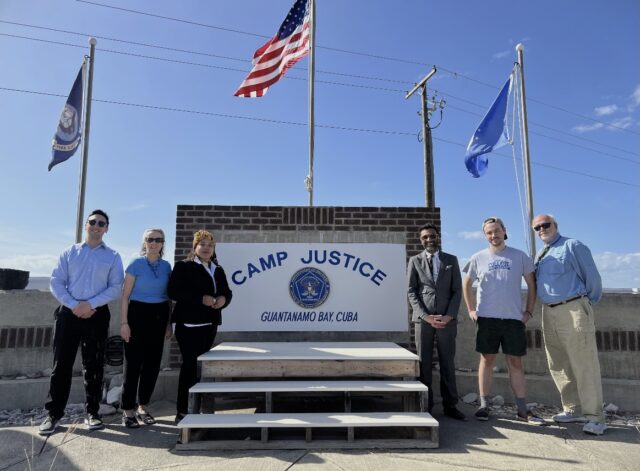
The detention and trial regime at US naval base Guantanamo Bay remains shrouded in secrecy and hugely controversial internationally. Of the 779 people detained there since January 2002, 740 have been transferred elsewhere with 30 remaining. 9 detainees have died in custody.
In 2019, the Bar Human Rights Committee of England and Wales (BHRC) became the only UK-based organisation to be granted official observer status for the ongoing trials at the Military Commission. BHRC has consistently expressed concern about the use of the detention facility and the lack of procedural developments within the trials. Since 2019, BHRC has observed three cases and submitted amicus briefs to the Court and Court of Military Commissions Review.1
BHRC continues to highlight human rights issues and express serious concern that the proceedings before the Military Commissions demonstrate a fundamental departure from fair trial norms and the rule of law and call for the closure of Camp Justice.
During February and March 2024, I observed the 49th set of pretrial hearings in the case of U.S.A. v. Khalid Sheikh Mohammed, et. al – the trial of five men at a specially created Military Commission for a range of crimes relating to the planning of the 9/11 hijackings and attacks on the US.
On behalf of BHRC, I traveled from Joint Base Andrews in Washington, D.C. to Guantanamo Bay on 24th February. I stayed in temporary barracks on site near Camp Justice where the trials take place. I was given access to most of Camp Justice and a space to work within a dedicated NGO temporary office. I was also provided with a mechanism to raise queries and requests in relation to the ongoing court hearings. Everyone I met during my visit treated me with respect and courtesy.
Apart from myself, there were 5 other people who had traveled to Guantanamo Bay, each representing an approved NGO; I was the only foreign national on site at Camp Justice. It was a huge privilege to be given the access that I was and to have been able to learn about the current state of Guantanamo Bay and those detained there. I hope to embark on follow up visits as the pre-trial hearings continue. In anticipation of writing a full trial observation report on the hearings and the legal issues, I provide here a brief summary of the visit.
The defence lawyers in the current set of pre-trial hearings sought to suppress confessions that FBI agents elicited from the detainees in early 2007, over a year after the men had been transferred into formal detention at Guantanamo from various CIA black sites (though Guantanamo had previously been a black site).2 They argued that the torture the detainees had suffered from at the hands of CIA contract interrogators made the confessions unreliable. The FBI then used the coerced statements to help build the criminal case against the detainees.
As well as hearing submissions by all parties, the court heard the oral evidence of key witnesses. These included Dr James Mitchell (a psychologist hired by the CIA) who took part in the interrogation of the detainees. Dr Mitchell previously testified in this case over nine days in 2020 and he also testified in the Al-Nashiri case over three days in 2022.
Dr Mitchell gave evidence about the “Enhanced Interrogation Techniques” used against the detainees.
The court also heard the evidence of Special Agent James Hodgson. Mr. Hodgson was part of an operation called the Fan Mail Project, in which he examined the detainees’ incoming and outgoing mail to elicit intelligence information. Mr. Hodgson was also part of the FBI clean-team interviews. The US government had directed the FBI to create these clean teams to interview and obtain so-called untainted confessions from the accused.
Many of the pre-trial submissions made during the BHRC observation focused on the defence application to suppress these statements on the theory that the statements were not, in fact, voluntarily given. From the defence’s perspective, the idea that the detainees were not influenced by the risk of being tortured for a failure to cooperate was not credible.
This argument was also raised in the Al-Nashiri case and on 18th August 2023 the trial judge in that case ruled that confession evidence was tainted by torture and would not be admissible at trial. The State appealed to the US Court of Military Commissions Review and BHRC filed an amicus brief as to the international treatment of evidence obtained through torture. The appeal remains pending.
The ability for BHRC legal observers to attend trial proceedings in person at the base is immensely valuable in a process which is marred by endemic secrecy and deviation from procedural fair trial norms. Such observations allow for independent analysis of the fairness of the proceedings and the legal issues, including, for instance, reliance upon evidence tainted by torture and other divergence from these fundamental principles in the name of national security.
The hearings will continue later this year. I look forward to BHRC publishing my trial observation report shortly with an analysis of the legal issues arising from the ongoing proceedings.
Zimran Samuel MBE
Barrister & BHRC Executive Committee
London
Notes to the Editor:
1. BHRC’s previous work on Guantanamo Bay: BHRC submits Al Nashiri amicus brief to the Court of Military Commission Review, September 2023; BHRC launches update to Guantanamo Military Commissions Trial Observation Report with a virtual panel event June 2, 2023; BHRC Trial Observation USA v Mohammed et al, September 2021; BHRC issues Amicus to the Guantanamo Bay Military Tribunal on torture derived evidence, February 22, 2019
2. Carol Rosenberg, “Judge in Sept 11. Case Visits Former C.I.A. Black Site” (New York Times, 26 April 2024)

